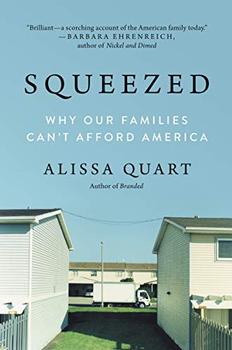Summary | Excerpt | Reading Guide | Reviews | Beyond the Book | Readalikes | Genres & Themes | Author Bio

Why Our Families Can't Afford America
by Alissa QuartINTRODUCTION
Michelle Belmont's debt haunted her. It was almost unspeakable, but it was a raw relief when anyone asked her about it. She wanted people to hear about her life as she lived it, how her debt trailed her like a child's monster, how it was there when she went to the supermarket, to her son's day care, and home to her one-bedroom apartment.
It began as it often does, with the student loans for the college her parents back home in Georgia thought would ensure the right future. Then there was the money she borrowed for her master's of library science degree. A bit later, when baby Eamon came along, she and her husband owed over $20,000 in hospital bills as well. What was shocking were the price tags, just for normal things, like Michelle's labor and her overnight stay. She had required a few days extra at the hospital: Eamon had been born weighing ten pounds, thirteen ounces, and she had pushed that hefty creature for five hours.
"I thought that insurance helps you get by," Michelle told me. "But my husband had a really cheap insurance, and you get what you pay for."
Then the debt shadow monster just grew. Eamon developed a fever of 103 degrees and had to go back to the hospital.
There were two years of surgeries. The bills piled up on the kitchen table. Michelle tried to pay them off, for fear of getting refused treatment later, but then she stopped opening the envelopes. They were different colors. They demanded payment now or legal action, in screaming capital letters. She saw herself on trial, in court, explaining why she had nothing in her account. Her debt was six figures and growing.
The couple had struggled before they had their baby, Michelle said, but then "it got astronomically insane after Eamon was born. We always had money for food before, but now it's, 'How are we going to eat?' I'll borrow from one credit card bill to pay that other credit card bill. I can't find rent money each paycheck, and we make a decent salary between us."
Michelle Belmont was fighting to stay middle-class. She hoped to train herself into a career of certitude—to become a technological librarian, to set up her future. But the costs were beyond what she ever imagined, and she grew more vulnerable. Meanwhile, the squeeze tightened. The Belmonts lived in a modest one-bedroom apartment in Minneapolis that she and her husband paid $1,300 per month to rent. Minneapolis, with its supposed hipster status and so-called Midwest Modern food and furniture and textiles, was only getting more expensive for Michelle. When I first spoke to her, it seemed unlikely that the Belmonts would ever be free of debt.
"That requires nothing bad to happen," Michelle said, almost laughing.
But bad things do happen.
When I first spoke to Michelle, her concerns were not abstract to me. Back then, I had recently given birth to my daughter. And it wasn't until I had my own child that I quickly realized that I too had entered the falling middle-class vortex. My girl was born face-first—sunny-side up, as they say—her unblinking stare promising new joy and terror. Her cries soon became the soundtrack of the antiromantic comedy of our lives. My husband and I wound up with an unexpected $1,500 bill after her birth that we hustled to pay; most Americans owe even more, an average of around $5,000. Although we managed to avoid the financial perils that many of the people you will meet in this book experienced—partly because of the wonder of having a New York City rent-stabilized apartment—we did go through a few years of fiscal vertigo. We had been freelance writers for most of our careers, but by the time my daughter arrived this was no longer a stable line of work for the majority of its practitioners, including us. And now we had day-care costs and hospital bills. We started to search for jobs with regular pay, regular hours, and health insurance.
Excerpt from Squeezed: Why Our Families Can't Afford America by Alissa Quart. Copyright 2018 by Alissa Quart. Excerpted by permission of Ecco, an imprint of HarperCollins Publishers.
Your guide toexceptional books
BookBrowse seeks out and recommends the best in contemporary fiction and nonfiction—books that not only engage and entertain but also deepen our understanding of ourselves and the world around us.